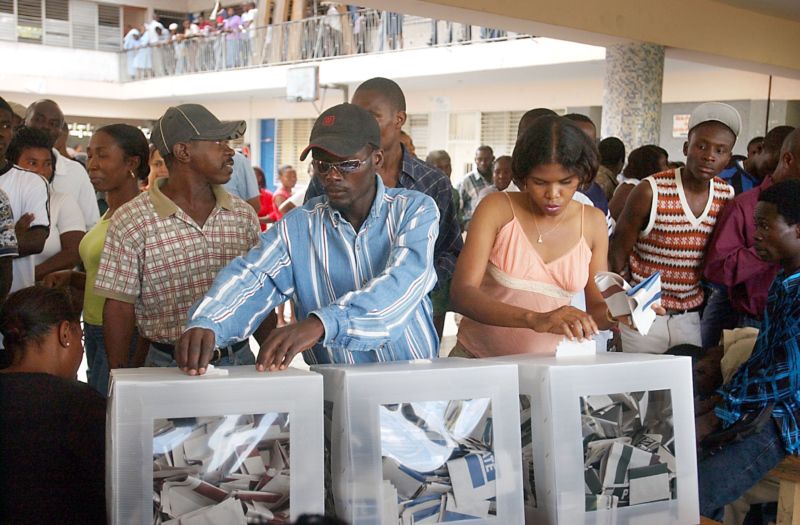New Bipartisanship Over Haiti is Promising
The sudden U.S. presidential unity on Haiti is promising, because Haiti has long been the subject of bitter partisan bickering in Washington.
More than 5 years after a devastating earthquake, Haiti keeps losing the world’s attention. The country’s dependence on foreign aid and inability to meaningfully kick-start economic development show a difficult future ahead for the Caribbean country. At present, Haiti finds itself in the middle of an electoral process, in which a new president will be elected, as well as a new legislature and local governments, bringing the country back into the spotlight. However, elections are long overdue and many think the country lacks the political will, capacity, and resources to run a fully free and fair electoral process.
On August 21, 2015, at an event co-hosted by the Inter-American Dialogue and the Elliott School of International Affairs at George Washington University, Professor Robert Fatton from the University of Virginia and Professor Robert Maguire engaged in a conversation, moderated by Dialogue President Emeritus and Senior Fellow Peter Hakim, about the challenges and significance of this electoral process in the context of a country with many development and political challenges. Maguire started the session by making a very important historical comparison. Haiti’s first democratic elections in 1990 were described as “free, fair and flawed” but still an important step towards the strengthening of democracy. The first round of legislative elections took place on August 9th and was characterized by chaos and violence, according to Haitian media—seemingly little progress, even 25 years later. The headlines are the same but “the electoral panorama has gotten worse instead of better,” according to Maguire. To call the fact that the elections even took place a renewed step towards democratic rule in the country risks covering up the troubling state of politics in the Caribbean country.
As Fatton stressed, “there is growing cynicism about the electoral cycle.” The Haitian people have been historically frustrated by coups, nonresponsive officials and previous electoral cycles, creating a cycle that affects electoral processes and representation. Also, the lack of ideology in elections has derived in increased opportunism in the political system, to which Maguire added, “politics is one of the only avenues of economic and social mobility for the regular Haitian youth.” The Haitian political system is in great need of a renewed political class given that they “keep doing the same thing for 40 years and getting the same results,” according to Maguire.
This electoral process has been marked by social unrest, irregularity and allegations of unfairness and lack of independence of the Provisional Electoral Council (CEP), the institution in charge of organizing the election process. The disqualification of several popular candidates has led many to think that the CEP is manipulating the elections to President Martelly’s favor, leading Fatton to call it a “selection” instead of an election. Although, this has been the first time that all parties agree to participate in the elections without boycotting them, the first round of legislative elections showed a rate of abstention of 82% country-wide and 50% of the polling centers were affected by violence, intimidation and fraud, according to Fatton. This has led the CEP to choose to redo the elections in 25 constituencies. This reiterates the public perception that the CEP lacks the organizational capacity to carry out successful elections.
Additionally, the international community has been heavily criticized for their role, or lack thereof, in Haiti’s electoral process. According to Maguire, “there is an international acceptance of the bad organization of elections.” International electoral observers have observed that despite the setbacks in this electoral process, the fact that elections even happened is positive for Haiti. To Maguire, this reveals an issue of international organizations lowering their electoral standards for Haiti—although this assertion was disputed by representatives of the Organization of American States in the audience. In either case, both panelists agreed that it is too late to make any recommendations or changes to the international community to change the course of this process, “everyone knew what was going to happen and no one did anything about it,” said Fatton.
The electoral and political outlook in Haiti does not look promising, exacerbating the range of issues the new government will have to face. Although many expect the CEP to learn from their mistakes, Maguire argued, “this is the same message we’ve been hearing since the return to democracy.” The experts concluded that the same conditions from the August 9th election are expected to continue through the presidential election on October 25th and emphasized the importance of not neglecting the local elections. Finally, although having these elections is essential to maintain democratic rule, the fact that elections are only taking place after a great amount of social unrest and pressure on the president, according to Fatton, symbolizes the “evisceration of the political system.” Unfortunately, elections in Haiti have only a very slim chance of improving the tense political situation.
The sudden U.S. presidential unity on Haiti is promising, because Haiti has long been the subject of bitter partisan bickering in Washington.
The worldwide outpouring of support for Haitians from governments and ordinary citizens has been extraordinary. But this heroic phase of the emergency response is drawing to a close.
After a 7.0 magnitude earthquake struck Haiti, the aftershock reached China in ways that few anticipated.The earthquake forced Chinese leaders to navigate the tricky politics of disaster relief.
 Marcello Casal Jr. / CC BY 3.0 BR
Marcello Casal Jr. / CC BY 3.0 BR